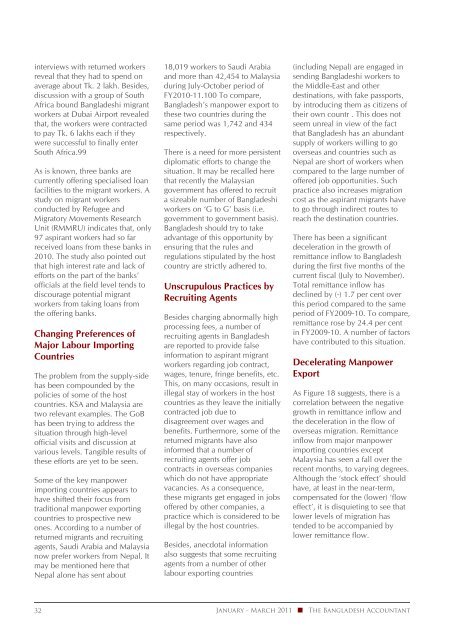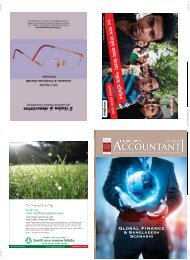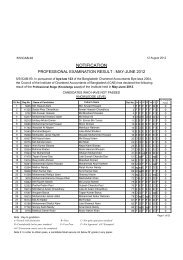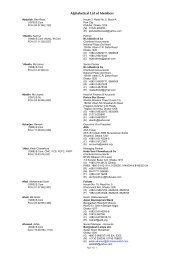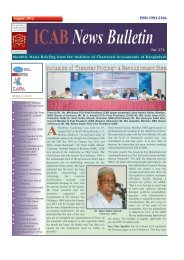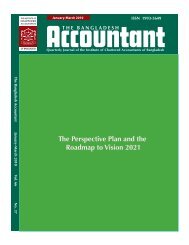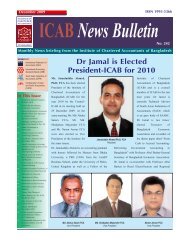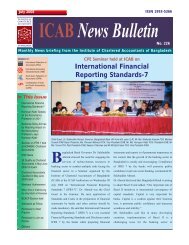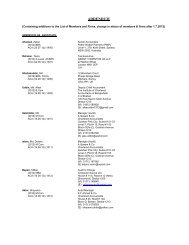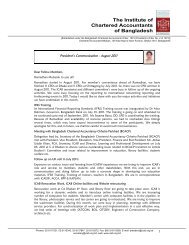Forma # 1.ai - ICAB
Forma # 1.ai - ICAB
Forma # 1.ai - ICAB
Create successful ePaper yourself
Turn your PDF publications into a flip-book with our unique Google optimized e-Paper software.
interviews with returned workers<br />
reveal that they had to spend on<br />
average about Tk. 2 lakh. Besides,<br />
discussion with a group of South<br />
Africa bound Bangladeshi migrant<br />
workers at Dubai Airport revealed<br />
that, the workers were contracted<br />
to pay Tk. 6 lakhs each if they<br />
were successful to finally enter<br />
South Africa.99<br />
As is known, three banks are<br />
currently offering specialised loan<br />
facilities to the migrant workers. A<br />
study on migrant workers<br />
conducted by Refugee and<br />
Migratory Movements Research<br />
Unit (RMMRU) indicates that, only<br />
97 aspirant workers had so far<br />
received loans from these banks in<br />
2010. The study also pointed out<br />
that high interest rate and lack of<br />
efforts on the part of the banks’<br />
officials at the field level tends to<br />
discourage potential migrant<br />
workers from taking loans from<br />
the offering banks.<br />
Changing Preferences of<br />
Major Labour Importing<br />
Countries<br />
The problem from the supply‐side<br />
has been compounded by the<br />
policies of some of the host<br />
countries. KSA and Malaysia are<br />
two relevant examples. The GoB<br />
has been trying to address the<br />
situation through high‐level<br />
official visits and discussion at<br />
various levels. Tangible results of<br />
these efforts are yet to be seen.<br />
Some of the key manpower<br />
importing countries appears to<br />
have shifted their focus from<br />
traditional manpower exporting<br />
countries to prospective new<br />
ones. According to a number of<br />
returned migrants and recruiting<br />
agents, Saudi Arabia and Malaysia<br />
now prefer workers from Nepal. It<br />
may be mentioned here that<br />
Nepal alone has sent about<br />
18,019 workers to Saudi Arabia<br />
and more than 42,454 to Malaysia<br />
during July‐October period of<br />
FY2010‐11.100 To compare,<br />
Bangladesh’s manpower export to<br />
these two countries during the<br />
same period was 1,742 and 434<br />
respectively.<br />
There is a need for more persistent<br />
diplomatic efforts to change the<br />
situation. It may be recalled here<br />
that recently the Malaysian<br />
government has offered to recruit<br />
a sizeable number of Bangladeshi<br />
workers on ‘G to G’ basis (i.e.<br />
government to government basis).<br />
Bangladesh should try to take<br />
advantage of this opportunity by<br />
ensuring that the rules and<br />
regulations stipulated by the host<br />
country are strictly adhered to.<br />
Unscrupulous Practices by<br />
Recruiting Agents<br />
Besides charging abnormally high<br />
processing fees, a number of<br />
recruiting agents in Bangladesh<br />
are reported to provide false<br />
information to aspirant migrant<br />
workers regarding job contract,<br />
wages, tenure, fringe benefits, etc.<br />
This, on many occasions, result in<br />
illegal stay of workers in the host<br />
countries as they leave the initially<br />
contracted job due to<br />
disagreement over wages and<br />
benefits. Furthermore, some of the<br />
returned migrants have also<br />
informed that a number of<br />
recruiting agents offer job<br />
contracts in overseas companies<br />
which do not have appropriate<br />
vacancies. As a consequence,<br />
these migrants get engaged in jobs<br />
offered by other companies, a<br />
practice which is considered to be<br />
illegal by the host countries.<br />
Besides, anecdotal information<br />
also suggests that some recruiting<br />
agents from a number of other<br />
labour exporting countries<br />
(including Nepal) are engaged in<br />
sending Bangladeshi workers to<br />
the Middle‐East and other<br />
destinations, with fake passports,<br />
by introducing them as citizens of<br />
their own countr . This does not<br />
seem unreal in view of the fact<br />
that Bangladesh has an abundant<br />
supply of workers willing to go<br />
overseas and countries such as<br />
Nepal are short of workers when<br />
compared to the large number of<br />
offered job opportunities. Such<br />
practice also increases migration<br />
cost as the aspirant migrants have<br />
to go through indirect routes to<br />
reach the destination countries.<br />
There has been a significant<br />
deceleration in the growth of<br />
remittance inflow to Bangladesh<br />
during the first five months of the<br />
current fiscal (July to November).<br />
Total remittance inflow has<br />
declined by (‐) 1.7 per cent over<br />
this period compared to the same<br />
period of FY2009‐10. To compare,<br />
remittance rose by 24.4 per cent<br />
in FY2009‐10. A number of factors<br />
have contributed to this situation.<br />
Decelerating Manpower<br />
Export<br />
As Figure 18 suggests, there is a<br />
correlation between the negative<br />
growth in remittance inflow and<br />
the deceleration in the flow of<br />
overseas migration. Remittance<br />
inflow from major manpower<br />
importing countries except<br />
Malaysia has seen a fall over the<br />
recent months, to varying degrees.<br />
Although the ‘stock effect’ should<br />
have, at least in the near‐term,<br />
compensated for the (lower) ‘flow<br />
effect’, it is disquieting to see that<br />
lower levels of migration has<br />
tended to be accompanied by<br />
lower remittance flow.<br />
32<br />
January - March 2011<br />
The Bangladesh Accountant


